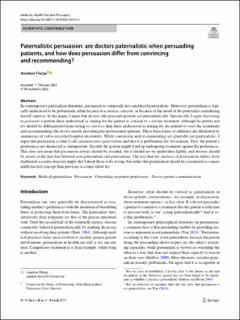| dc.contributor.author | Fleisje, Anniken | |
| dc.date.accessioned | 2024-02-12T08:24:59Z | |
| dc.date.available | 2024-02-12T08:24:59Z | |
| dc.date.created | 2023-03-03T13:28:26Z | |
| dc.date.issued | 2023 | |
| dc.identifier.citation | Medicine, Health care and Philosophy. 2023, 1-13. | en_US |
| dc.identifier.issn | 1386-7423 | |
| dc.identifier.uri | https://hdl.handle.net/11250/3116748 | |
| dc.description.abstract | In contemporary paternalism literature, persuasion is commonly not considered paternalistic. Moreover, paternalism is typically understood to be problematic either because it is seen as coercive, or because of the insult of the paternalist considering herself superior. In this paper, I argue that doctors who persuade patients act paternalistically. Specifically, I argue that trying to persuade a patient (here understood as aiming for the patient to consent to a certain treatment, although he prefers not to) should be differentiated from trying to convince him (here understood as aiming for the patient to want the treatment) and recommending (the doctor merely providing her professional opinion). These three forms of influence are illustrated by summaries of video-recorded hospital encounters. While convincing and recommending are generally not paternalistic, I argue that persuasion is what I call communicative paternalism and that it is problematic for two reasons. First, the patient’s preferences are dismissed as unimportant. Second, the patient might wind up undergoing treatment against his preferences. This does not mean that persuasion always should be avoided, but it should not be undertaken lightly, and doctors should be aware of the fine line between non-paternalism and paternalism. The fact that my analysis of paternalism differs from traditional accounts does not imply that I deem these to be wrong, but rather that paternalism should be considered as a more multi-faceted concept than previous accounts allow for. | en_US |
| dc.language.iso | eng | en_US |
| dc.rights | Navngivelse 4.0 Internasjonal | * |
| dc.rights.uri | http://creativecommons.org/licenses/by/4.0/deed.no | * |
| dc.title | Paternalistic persuasion: are doctors paternalistic when persuading patients, and how does persuasion differ from convincing and recommending? | en_US |
| dc.type | Peer reviewed | en_US |
| dc.type | Journal article | en_US |
| dc.description.version | publishedVersion | en_US |
| cristin.ispublished | true | |
| cristin.fulltext | original | |
| cristin.qualitycode | 1 | |
| dc.identifier.doi | 10.1007/s11019-023-10142-2 | |
| dc.identifier.cristin | 2131022 | |
| dc.source.journal | Medicine, Health care and Philosophy | en_US |
| dc.source.pagenumber | 1-13 | en_US |

